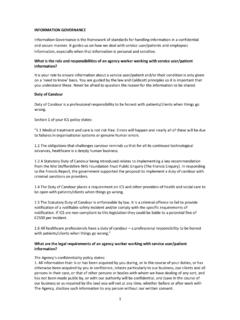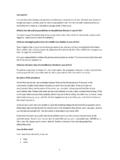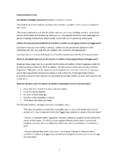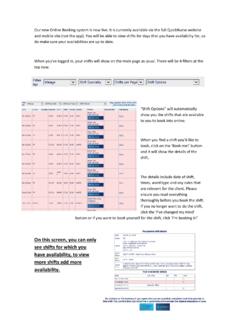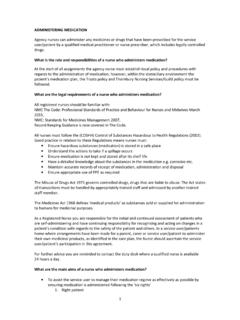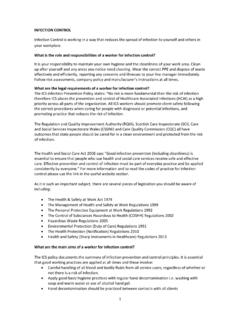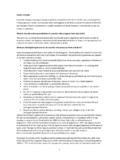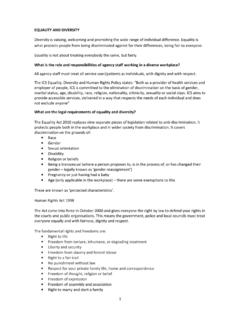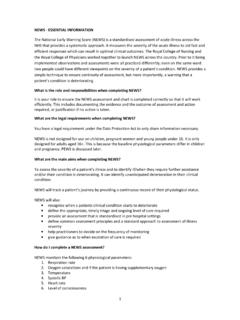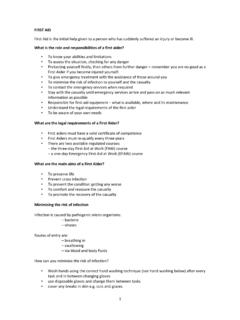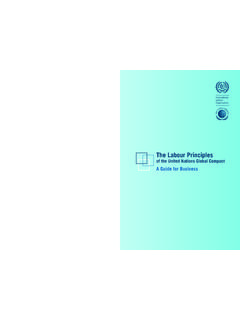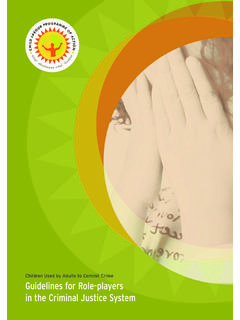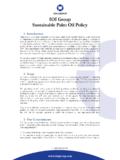Transcription of Complaints Handling 2016 v2 - Thornbury Quick Nurse
1 1 Complaints Handling Everyone has a right to complain about the care they receive. Complaints are a positive way to help us improve practice and identify training needs. Service user/patients must NEVER be treated less favourably if they make a complaint. What is the role and responsibilities of a worker when Handling a complaint? NEVER dismiss a service user/patients complaint. If they have raised it with you it is important to them, listen and advise them on the actions to take. Your Thornbury Nursing Services/Guild Policy states: We ask all clients, patients or agency workers to proceed as follows in case of enquiry, comment, complaint or untoward incident: In the first instance your concern should be registered with a member of the Duty Desk team, available 24 hours a day throughout the year. Details will be recorded and passed to the Complaints /Incidents team.
2 Minor Complaints /incidents may be resolved immediately, but where this is not possible a course of action will be agreed as soon as possible within a maximum of 24 hours. Complaints must be made in writing within 7 days and permission given to send the details onto the person concerned. We will also discuss with you any need for an exclusion during the investigation. If deemed appropriate, the agency worker may not be offered work through The Agency until the complaint/incident is resolved. Once the written complaint is received, a copy is sent on to the person concerned, with advice on writing a response statement. The written complaint is acknowledged within 3 working days. Additional documentation may be requested as required. This will be provided at the Clients discretion. Once a response statement is received, it is reviewed by the Complaints /Incidents Team and a copy is sent to the complainant with a request for a formal closure.
3 Once written closure is received, the complaint is closed with consideration being given to appraisal, training and development issues. Exclusions are upheld or withdrawn. If any party is dissatisfied with the response they receive, appeals should be addressed to the Regional Business Manager. In the case of Northern Ireland the Department of Health, Social Services and Public Safety provides guidance on the management of Complaints . The document can be found at: All complainants are entitled to have their complaint investigated in accordance with this Complaints procedure. If you remain dissatisfied with the outcome of a complaint you have the right to refer the complaint to the Northern Ireland Ombudsman. Contact details can be found at: The ICS policy for Complaints Handling states All Complaints are resolved in an open, timely and transparent manner and, where possible, resolved within 28 working days or within a time frame as agreed with the service user/client.
4 Lessons are learned from experience and changes made to improve services and the service user/client experience . 2 Duty of Candour Duty of Candour is a professional responsibility to be honest with patients/clients when things go wrong. Section 1 of your ICS policy states: Medical treatment and care is not risk free. Errors will happen and nearly all of these will be due to failures in organisational systems or genuine human errors. The obligations that challenges candour reminds us that for all its continued technological advances, healthcare is a deeply human business. A Statutory Duty of Candour being introduced relates to implementing a key recommendation from the Mid Staffordshire NHS Foundation Trust Public Enquiry (The Francis Enquiry). In responding to the Francis Report, the government supported the proposal to implement a duty of candour with criminal sanctions on providers.
5 The Duty of Candour places a requirement on ICS and other providers of health and social care to be open with patients/clients when things go wrong. The Statutory Duty of Candour is enforceable by law. It is a criminal offence to fail to provide notification of a notifiable safety incident and/or comply with the specific requirements of notification. If ICS are non-compliant to this legislation they could be liable to a potential fine of 2500 per incident. All healthcare professionals have a duty of candour a professional responsibility to be honest with patients/clients when things go wrong . What are the legal requirements of a worker when Handling a complaint? The Equality Act 2010 replaces nine separate pieces of legislation related to anti-discrimination. It protects people both in the workplace and in wider society from discrimination.
6 It covers discrimination because of: Race Gender Sexual orientation Disability Religion or beliefs Being a transsexual (where a person is in the process of or has changed their gender legally known as gender reassignment ) Pregnancy or just having had a baby Age (only applicable in the workplace) there are some exemptions to this Human Rights Act 1998 The Act came into force in October 2000 and gives everyone the right by law to defend your rights in the courts and public organisations. This means the government, police and local councils must treat everyone equally and with fairness, dignity and respect. 3 The fundamental rights and freedoms are: Right to life Freedom from torture, inhumane, or degrading treatment Liberty and security Freedom from slavery and forced labour Right to a fair trial No punishment without law Respect for your private family life, home and correspondence Freedom of thought, religion or belief Freedom of expression Freedom of assembly and association Right to marry and start a family Protection from discrimination in respect of these rights and freedoms Right to peaceful enjoyment of your property Right to education Right to participate in free elections What are the main aims of a worker when Handling a complaint?
7 You need to ensure your service user/patient feels that making a complaint was a positive experience and does not feel they did the wrong thing. It is important that you support the service user/patient, making a complaint is often very difficult for them. Listen, do not judge, do not give your opinion and guide them through the Complaints process. If you need help telephone the Duty Desk and ask for advice. Do not say you will do something you cannot do, explain the procedures and do not raise their expectations unrealistically. Remember Complaints are a positive and give an opportunity to improve the overall service. Whistleblowing/Bullying The ICS Policy on Whistle-blowing complies with the Public Interest Disclosure Act 1998 in protecting and not victimising any worker who seeks to report, and has investigated, a genuine and reasonable concern about any form of malpractice that they encounter in the course of their work.
8 Where you have concerns relating to safety or health dangers at work where there may be an oversight relating to legal obligations, care standards or practices, etc., you should raise the matter with the Registered Manager. If the matter is not resolved satisfactorily you should make your concerns known again but this time in writing to the Registered Person. If you have acted in good faith, not seeking personal gain out of the situation, the law is on your side. Where legitimate concerns have been raised, it is illegal for The Agency to cause you detriment as a result. Always follow the Trusts policy and inform Thornbury Nursing Services/Guild of your concerns. If you feel you need advice call the Duty Desk Team. 4 Should we be unable to satisfy the concerns raised, you are entitled to take the matter to a legal representative, CQC, Care Inspectorate, RQIA or other government officer.
9 You may do this without notifying us first but only where you have good grounds for not having notified the Registered Manager or Registered Person first. VIDEOS NHS Choices - How to complain: What is the NHS Complaints procedure?: NHS Training video: NHS Communications Training positive: Handling Complaints : USEFUL WEBSITES SCIE Dignity in care Complaints this has not been updated since May 2013, however it is still good practice. The MDU: Professional medical indemnity for clinical negligence claims: Health watch: A Review of the NHS Hospitals Complaints System Putting Patients Back in the Picture: REFERENCES Healthwatch. ( ). Healthwatch. Retrieved June 20, 2014, from Healthwatch: NHS. ( ). Guide to good Handling of Complaints for CCGs. Retrieved June 20, 2014, from NHS: Online, D. L. ( ). NHS Complaints system.
10 Retrieved June 20, 2014, from You tube: Training, R. ( ). Complaint Handling Skills. Retrieved June 20, 2014, from You Tube: Reviewed 25/08/2016
